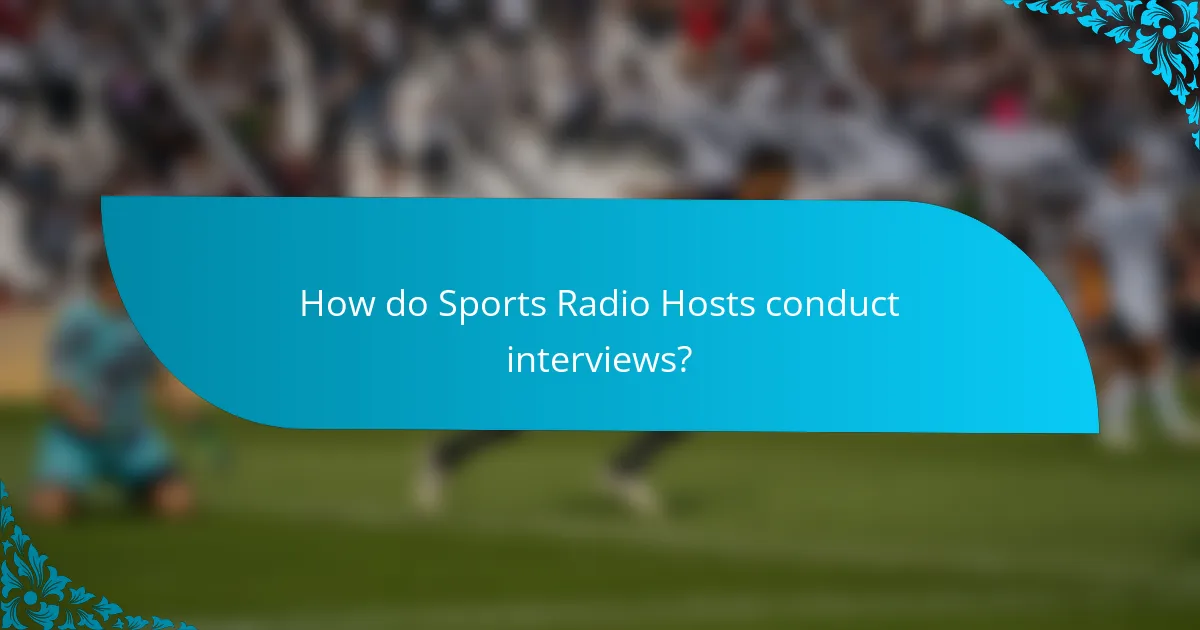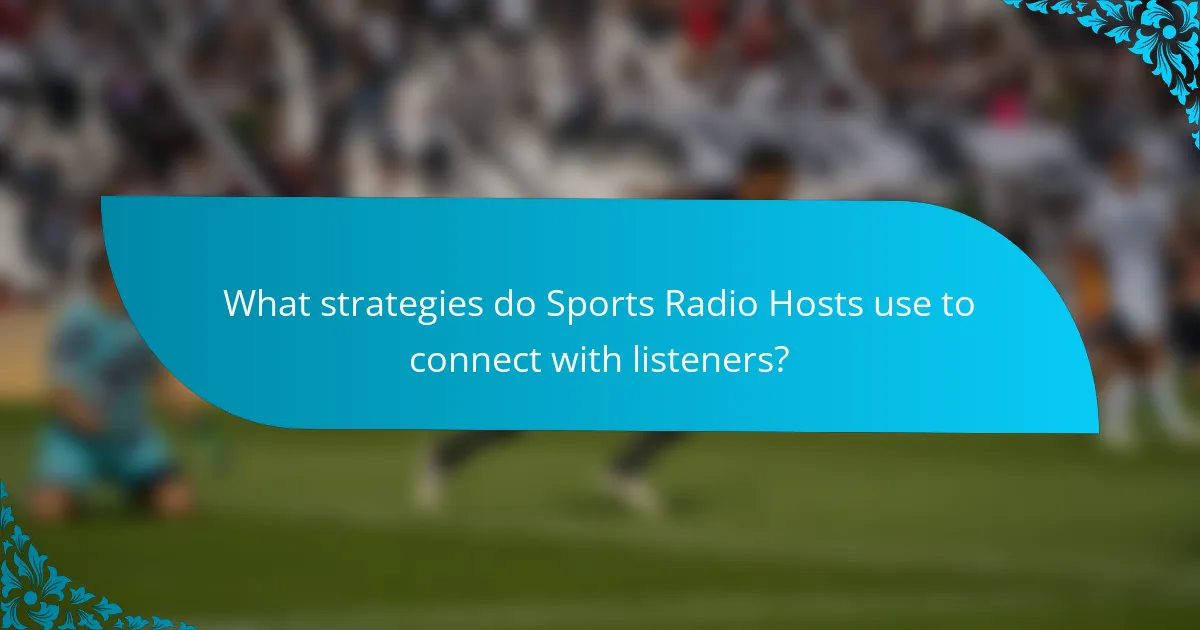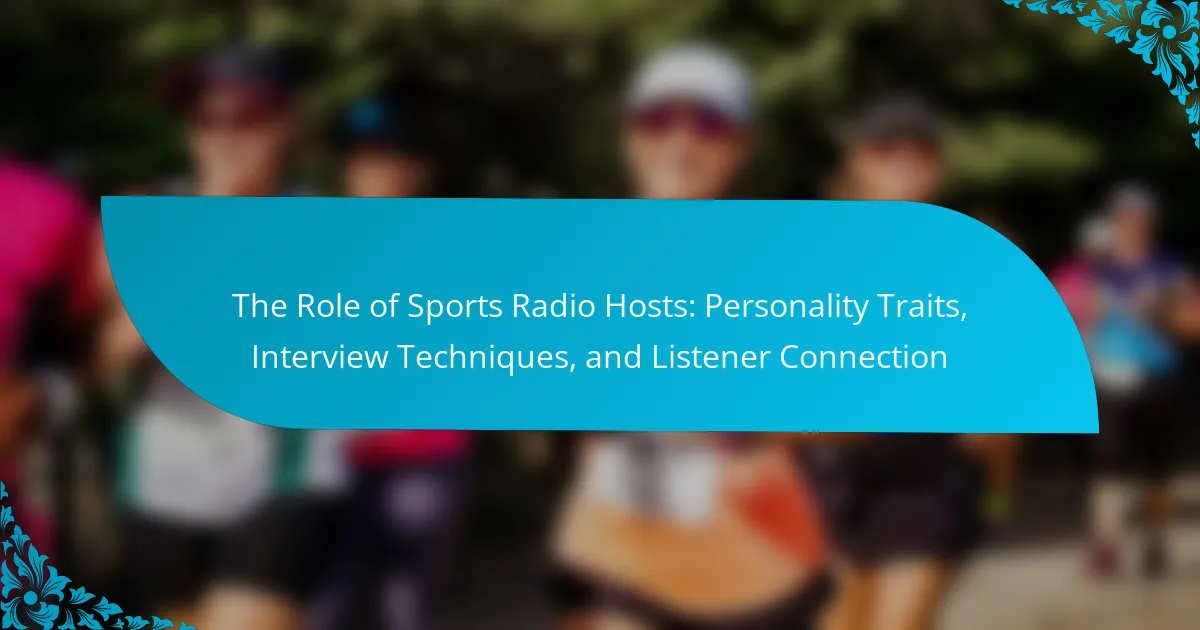Sports radio hosts are essential communicators who deliver sports-related content, including analysis, commentary, and updates on events. They engage audiences through discussions about teams, players, and games, often interviewing athletes and analysts to provide deeper insights. Effective hosts utilize strong communication skills and sports knowledge to foster a community among fans, employing strategies such as interactive segments and personal storytelling to enhance listener connection. Their ability to adapt interview techniques and maintain a balance between professionalism and relatability is crucial for keeping audiences engaged. Overall, sports radio hosts play a vital role in creating an entertaining and informative listening experience.

What is the Role of Sports Radio Hosts?
Sports radio hosts serve as the primary communicators of sports-related content to their audience. They provide analysis, commentary, and updates on various sports events. Hosts engage listeners through discussions about teams, players, and games. They often interview athletes, coaches, and sports analysts to provide insights. Additionally, sports radio hosts create a connection with their audience by sharing personal stories and opinions. Their role includes entertaining, informing, and fostering a community among sports fans. Effective hosts must possess strong communication skills and a deep knowledge of sports. This combination enhances the listening experience and keeps audiences engaged.
How do Sports Radio Hosts influence the sports broadcasting landscape?
Sports radio hosts significantly influence the sports broadcasting landscape by shaping audience engagement and content delivery. They create a unique connection with listeners through their personality traits. Their ability to communicate effectively fosters a loyal listener base. Hosts often provide expert analysis and commentary that enhances the understanding of sports topics. This analysis influences public opinion and fan discussions. Furthermore, sports radio hosts drive the conversation around events and trends, impacting how sports news is consumed. They often serve as the bridge between fans and sports organizations. Their influence extends to social media, where they amplify discussions and reach broader audiences. Overall, sports radio hosts play a crucial role in defining the sports broadcasting experience.
What are the key responsibilities of a Sports Radio Host?
A Sports Radio Host is responsible for delivering engaging sports content to listeners. They provide commentary on sports events, analyze games, and discuss player performances. Hosts conduct interviews with athletes, coaches, and sports experts. They interact with listeners through calls, social media, and live events. Hosts research sports news and trends to stay informed. They create and curate content for their shows, ensuring relevance and interest. Hosts also manage the show’s pacing and flow, keeping the audience engaged. Additionally, they may promote upcoming sports events and station programming.
How do Sports Radio Hosts contribute to the overall listener experience?
Sports radio hosts enhance the overall listener experience through engaging commentary and expert analysis. They provide insights into games, players, and strategies that deepen listener understanding. Their personality traits, such as humor and relatability, create a connection with the audience. Hosts often share personal stories and opinions that resonate with listeners. This fosters a sense of community among fans. Additionally, hosts facilitate listener interaction through call-ins and social media. This engagement allows listeners to feel involved in the conversation. Research shows that active listener participation increases loyalty to the station. Overall, sports radio hosts play a crucial role in making the listening experience enjoyable and informative.
What personality traits are essential for Sports Radio Hosts?
Essential personality traits for sports radio hosts include charisma, knowledge, and communication skills. Charisma helps engage listeners and create a connection. Knowledge about sports, teams, and statistics is crucial for credibility. Communication skills enable hosts to articulate thoughts clearly and entertain audiences. Additionally, adaptability is vital for responding to live situations and unexpected events. A sense of humor can enhance the listening experience and keep the audience entertained. Lastly, passion for sports drives enthusiasm and keeps hosts motivated. These traits collectively contribute to a successful sports radio host.
How does charisma impact a Sports Radio Host’s effectiveness?
Charisma significantly enhances a Sports Radio Host’s effectiveness. Charismatic hosts engage listeners through compelling communication. They create a connection that keeps audiences tuned in. This connection fosters loyalty among listeners. Research shows that hosts with charisma are perceived as more trustworthy. Trust leads to increased listener retention and interaction. Charismatic hosts often attract larger audiences, boosting ratings. A study published in the Journal of Broadcasting & Electronic Media supports these findings, highlighting the importance of personality traits in media effectiveness.
What role does authenticity play in listener connection?
Authenticity fosters a deeper connection between sports radio hosts and their listeners. When hosts express genuine emotions and thoughts, listeners perceive them as relatable and trustworthy. This relatability enhances listener engagement and loyalty. Research indicates that authentic communication can increase audience retention by up to 30%. Moreover, listeners are more likely to share content from hosts they find authentic. This sharing amplifies the host’s reach and influence. In summary, authenticity is crucial for building strong listener connections in sports radio.

How do Sports Radio Hosts conduct interviews?
Sports radio hosts conduct interviews by preparing questions in advance. They research the interviewee’s background and recent activities. This helps them ask relevant and engaging questions. During the interview, hosts create a comfortable atmosphere. They use active listening to respond to the interviewee’s answers. This encourages a natural flow of conversation. Hosts also adapt their questions based on the interviewee’s responses. This flexibility can lead to unexpected insights. Good sports radio hosts balance professionalism with a personable approach. This enhances listener engagement and connection.
What techniques do Sports Radio Hosts use to engage guests?
Sports radio hosts use various techniques to engage guests effectively. They often employ open-ended questions to encourage detailed responses. This technique allows guests to share their insights and stories. Additionally, hosts use active listening to show genuine interest in the guests’ answers. This fosters a comfortable atmosphere for discussion.
Hosts also incorporate humor to lighten the mood and build rapport. Engaging in relatable anecdotes can create a connection with the guest. They may also use timely sports references to keep the conversation relevant. This technique demonstrates the host’s knowledge and keeps the audience engaged.
Furthermore, hosts often summarize key points during the conversation. This reinforces understanding and keeps the dialogue focused. Engaging guests through interactive segments, such as listener questions, enhances participation. These techniques collectively improve the guest experience and enhance listener engagement.
How do Sports Radio Hosts prepare for interviews?
Sports radio hosts prepare for interviews by conducting thorough research on their guests. They gather information about the guest’s background, recent performances, and relevant news. Hosts also formulate questions in advance to guide the conversation. They practice active listening to engage with the guest effectively. Additionally, hosts may review previous interviews for context and insights. This preparation helps create a more dynamic and informative discussion. Research shows that well-prepared hosts lead to higher listener engagement and satisfaction.
What types of questions are most effective during interviews?
Open-ended questions are most effective during interviews. These questions encourage detailed responses and facilitate deeper conversations. Examples include “Can you describe your experience with…?” or “What are your thoughts on…?” Such questions allow interviewees to express their insights fully. Research shows that open-ended questions lead to richer information exchange. Closed questions, which require simple yes or no answers, limit dialogue. Effective interviews often use a mix of both question types. However, prioritizing open-ended questions enhances engagement and understanding.
How do interview techniques affect listener engagement?
Interview techniques significantly influence listener engagement. Effective techniques, such as open-ended questions and active listening, encourage deeper conversations. These methods create a dynamic interaction between the host and the guest. Engaged listeners are more likely to stay tuned and participate. Research shows that interviews using storytelling enhance emotional connections with the audience. This emotional engagement can lead to increased loyalty and listenership. A study by the Pew Research Center found that engaging content is a key factor in listener retention. Thus, employing effective interview techniques can markedly boost listener engagement.
What impact does the interview format have on audience retention?
The interview format significantly influences audience retention. Engaging interview formats can maintain listener interest and encourage longer listening durations. Formats that include dynamic questioning and interactive elements tend to capture attention more effectively. Research indicates that listeners are more likely to stay tuned when hosts employ storytelling and relatable content during interviews. Additionally, interviews featuring well-known guests can enhance retention due to the audience’s pre-existing interest in those individuals. Overall, a well-structured interview format fosters a connection with the audience, leading to improved retention rates.
How can Sports Radio Hosts adapt their style for different guests?
Sports radio hosts can adapt their style for different guests by adjusting their tone, pacing, and questioning techniques. Hosts should assess the guest’s background and expertise to tailor their approach. For instance, a former athlete may appreciate a more casual tone, while a coach might prefer a professional demeanor. Pacing can be modified based on the guest’s comfort level; some may thrive in fast-paced discussions, while others may need a slower, more deliberate exchange. Hosts should also vary their questioning style. Open-ended questions can encourage storytelling, while direct questions may be better for guests who prefer concise answers. Understanding the guest’s personality can enhance the interaction and foster a more engaging conversation. This adaptability can lead to a richer dialogue and a better listening experience for the audience.

What strategies do Sports Radio Hosts use to connect with listeners?
Sports radio hosts use various strategies to connect with listeners. They engage in interactive segments, such as call-ins and social media interactions. This allows listeners to voice their opinions and ask questions directly. Hosts often share personal stories to create relatability. This builds a connection by making the audience feel included in the conversation.
Additionally, they employ humor and entertainment to keep the audience engaged. This approach helps maintain listener interest over extended periods. Hosts also stay informed about current sports events and trends. This knowledge enables them to provide relevant and timely commentary.
Furthermore, they often invite guest speakers, such as athletes or analysts. This brings diverse perspectives and enriches the conversation. Finally, consistent branding and a unique on-air personality help establish a loyal listener base. These strategies collectively enhance the connection between hosts and their audience.
How do Sports Radio Hosts build a loyal audience?
Sports radio hosts build a loyal audience through engaging content and strong personality traits. They create relatable and entertaining discussions that resonate with listeners. Consistent interaction with the audience fosters a sense of community. Hosts often incorporate listener feedback and questions into their shows. This involvement makes listeners feel valued and heard. They also utilize social media to maintain connections outside of broadcasts. By sharing personal stories and opinions, hosts build trust with their audience. Research indicates that hosts with distinct personalities attract more dedicated followers.
What role does social media play in listener interaction?
Social media enhances listener interaction by providing platforms for real-time communication. It allows listeners to engage with hosts and share feedback instantly. Platforms like Twitter and Facebook facilitate discussions around broadcasts. This interaction fosters a sense of community among listeners. Research indicates that 72% of listeners feel more connected to shows that use social media actively. Hosts can address listener comments during live shows, increasing engagement. Additionally, social media serves as a tool for audience polls and opinions. This feedback loop helps hosts tailor content to listener preferences. Overall, social media significantly enriches the listener experience.
How can Sports Radio Hosts create a sense of community among listeners?
Sports radio hosts can create a sense of community among listeners by fostering interactive engagement. They can encourage listener participation through call-ins, social media interactions, and live events. This interaction helps listeners feel valued and heard. Hosts can also share personal stories and experiences related to sports, creating relatability. By discussing local teams and events, they enhance the connection to the community. Furthermore, regular segments that highlight listener opinions or stories can strengthen this bond. Research shows that interactive formats increase listener loyalty and satisfaction. This strategy builds a loyal listener base and enhances community feeling among fans.
What are best practices for effective listener engagement?
Effective listener engagement involves actively involving the audience in the conversation. Hosts should ask open-ended questions to encourage participation. Utilizing social media platforms for real-time interaction enhances engagement. Personal anecdotes can create a relatable atmosphere for listeners. Regularly soliciting feedback helps tailor content to audience preferences. Consistent scheduling builds a loyal listener base. Engaging storytelling captures attention and maintains interest. Acknowledging listener contributions fosters a sense of community.
How can Sports Radio Hosts encourage listener feedback and participation?
Sports radio hosts can encourage listener feedback and participation through various interactive strategies. They can utilize social media platforms to engage listeners in real-time discussions. Hosts should regularly invite listeners to call in during live shows. This creates a direct line of communication. They can also set up polls and surveys to gather opinions on sports topics. Encouraging email or text message submissions for questions and comments fosters engagement. Additionally, hosts can highlight listener contributions on air to validate participation. This acknowledgment can motivate more listeners to share their thoughts. Engaging with audience feedback enhances the overall listener experience.
What techniques can enhance the overall listener experience?
Engaging storytelling techniques can enhance the overall listener experience. Storytelling captivates audiences by creating emotional connections. It allows hosts to present sports narratives in relatable ways. Active listening techniques improve the interaction between hosts and listeners. This fosters a sense of community and involvement. Utilizing sound effects and music can elevate the audio experience. These elements create an immersive atmosphere for listeners. Research indicates that interactive segments boost listener retention and participation. Engaging with the audience through social media also enhances their experience. These techniques contribute to a more enjoyable and memorable listening environment.
The main entity of this article is Sports Radio Hosts, who play a crucial role in delivering sports-related content, analysis, and commentary to their audience. The article outlines the responsibilities of sports radio hosts, including conducting interviews, engaging listeners, and fostering community through interactive segments. It highlights essential personality traits, such as charisma and authenticity, that enhance listener connection and retention. Additionally, the article discusses effective interview techniques and strategies for building a loyal audience, emphasizing the importance of listener feedback and participation in creating an engaging sports broadcasting experience.
